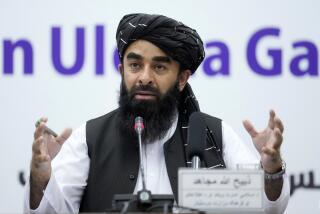Afghan security concerns to ease after 2014, Karzai says
NEW DELHI -- Afghan security after the departure of foreign combat troops in 2014 will become easier because of the ill-advised, misdirected and often corrupt ways NATO and its contractors have pursued the “war on terror,” Afghan President Hamid Karzai told reporters in India on Wednesday.
U.S.-led foreign troops have targeted Afghan villagers, including the use of special forces on night raids, rather than focusing on the real source of terrorism: foreign insurgents mounting attacks from bases in neighboring Pakistan, he said.
“Withdrawing of their forces from Afghanistan will be good for us,” Karzai, dressed in a long black robe, said at a breakfast meeting in New Delhi with Indian and foreign journalists. “We believe there will be more peace in Afghanistan when they leave. We believe those attacking Afghanistan will find it hard to attack.”
Karzai’s sharp criticism of the United States in recent months -- even as he calls on Washington to supply more aid, training and equipment -- reflects efforts to shore up political support at home, analysts said. By distancing himself from unpopular foreign missteps, including the killing of civilians in NATO airstrikes, he hopes to be seen as an Afghan nationalist and avoid looking like a Western pawn.
“He’s a complicated and complex customer,” said Rana Banerji, a retired Indian official and independent analyst. “This is a line that’s really not getting him anywhere.”
Karzai spoke at the end of a three-day trip during which he received an honorary doctorate from western India’s Lovely Professional University, touched base with Indian leaders, appealed for more aid and presented a request for military equipment and assistance from India. “It’s a wish list,” he said, when asked what it contained.
India has pledged greater support without providing details.
India and Afghanistan enjoy good relations and a shared wariness of Pakistan, which divides them geographically. India has funded $2 billion in Afghan infrastructure projects and trained hundreds of Afghan army officers and police. But its staff hostels, aid projects and embassy in Afghanistan have been bombed repeatedly by militants it believes are linked to Pakistan, reinforcing a reluctance to train or station troops on Afghan soil.
India isn’t likely to supply weapons to Afghanistan until the regional picture is clearer, said Vishal Chandra, a research fellow at New Delhi’s Institute for Defense Studies and Analyses. That includes U.S. strategic objectives after 2014, the outcome of Afghanistan’s upcoming election and what policy the new Pakistani government pursues following the electoral victory of Nawaz Sharif’s party.
Karzai tiptoed around the tricky shoals of regional diplomacy Wednesday. Afghanistan maintains longstanding relations with Iran and the United States as well as Pakistan and India despite their respective differences, he said, even as he expressed hope that Sharif would step up Pakistan’s battle against extremism.
“Pakistan has influence over the Taliban because they have residence there, to put it mildly,” he said. “It’s going to be a very cumbersome process for peace without Pakistan’s cooperation.”
Karzai’s meetings this week with Indian Prime Minister Manmohan Singh and President Pranab Mukherjee are part of a broader dance as regional powers maneuver for position in advance of NATO’s planned withdrawal.
India’s $2 billion in aid was well spent, with every dollar accounted for, Karzai told reporters, in contrast to U.S. assistance. Western media have accused his government of entrenched corruption, but he said that graft is to be expected in a developing country that saw state institutions wiped out by three decades of war.
A distinction must be made between homegrown graft, which is relatively negligible, and deep-seated corruption linked to foreign contracts, he said.
“The problem is very faulty, very superficially awarded contracts by the West, especially the United States, which has brought lots of corruption, massive corruption,” he said. “If it were Denmark criticizing Afghanistan, I would say it was valid, or if it were Norway. But if the United States does it, I would simply laugh at it.”
Karzai did not address the case of Kabul Bank, from which nearly $1 billion was siphoned off for the benefit of a few individuals, including three of Karzai’s relatives, with no apparent Western link.
Karzai said that under no circumstance would he continue as president after 2014, when his second term expires.
“I’m exhausted, totally exhausted,” he said. “Secondly, why would I ruin my legacy by staying on. ... It’s not good for me, nor Afghanistan.”
ALSO:
Iran presidential vote: Who’s in? Who’s out? Who cares?
Report: Life in prison sought for suspects in Bangladesh collapse
Mexico launches military push to restore order in Michoacan state
Tanvi Sharma in the Times’ New Delhi bureau contributed to this report.
More to Read
Sign up for Essential California
The most important California stories and recommendations in your inbox every morning.
You may occasionally receive promotional content from the Los Angeles Times.










